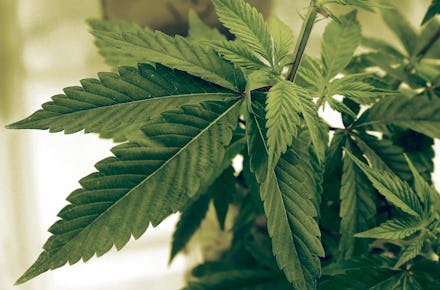A New Marijuana Derivative Could Bring Great News for People With Epilepsy

A team of doctors might have discovered the key to fighting epilepsy: medical marijuana.
Cannabidiol, or CBD, is a derivative of medical marijuana that doesn't contain any psychoactive properties. In a yearlong study, neurological researchers at NYU Langone Medical Center tested CBD's effectiveness at managing treatment-resistant epilepsy.
Their findings, published in Lancet Neurology, were promising: Patients' monthly motor seizures went down by a median of 36.5%.
"We are very encouraged by our trial results showing that CBD was safe and well-tolerated for most patients, and that seizures dropped significantly," lead researcher Orrin Devinsky, professor of neurology, neurosurgery and psychiatry, and director of NYU Langone's Comprehensive Epilepsy Center, said in a release.
The NYU team tested CBD treatment on epilepsy patients ages 1 through 30, tracking their symptoms at baseline, four weeks, eight weeks and 12 weeks. In addition to the median 36.5% reduction in monthly motor seizures, "two patients were free of all seizure types over the entire 12 weeks," the release stated.
The doctors haven't yet pinpointed why CBD proved more effective than other medications patients had tried in the past.
"However, we see this in other medication studies and in clinical practice: some proportion of patients respond to a new medication," Daniel Friedman, assistant professor in the Department of Neurology at NYU's epilepsy center, told Mic via email. "This may be because the new medication works in a different way than the previously used medications, or perhaps it has unique positive interactions with the medications the patient is already taking."
It's also possible that the trial coincided with a natural regression in certain patients' epilepsy.
"It may reflect the natural history of a disease that waxes and wanes in severity," Friedman said. "They happened to enter the study when they were at their worst and would have gotten better even if nothing was done."
The trial wasn't without hiccups. The patients experienced some adverse reactions, including decreased appetite, diarrhea, fatigue and convulsion. Though most were "mild to moderate and transient," according to the release, "20 patients had serious adverse events related to CBD use — most commonly status epilepticus, or seizures that last too long or too close together. Five patients had to discontinue treatment due to these adverse events."
Still, in their study, the researchers wrote that CBD "might have an adequate safety profile in children and young adults with highly treatment-resistant epilepsy."
What is treatment-resistant epilepsy? Patients with treatment-resistant epilepsy have seizures that can't be controlled by seizure medication, according to the Epilepsy Foundation.
The International League Against Epilepsy defines drug-resistant epilepsy as the "failure of adequate trials of two tolerated and appropriately chosen and used AED schedules (whether as monotherapies or in combination) to achieve sustained seizure freedom."
When it comes to epileptic seizures, definitions of "control" vary. But the Epilepsy Foundation suggests "epilepsy fails to come quickly under control with medicines in about one-third of cases." Given the more than 2 million cases of epilepsy in the United States, that's a lot of people who could potentially benefit, some day, from CBD.
Epilepsy isn't the only disease that CBD might help treat.
"There is some evidence from animal studies that CBD may have benefit in disorders as varied as Huntington's Disease, Hypoxic brain injury in newborns, psychiatric disorders such as schizophrenia and anxiety and addiction," Friedman said. "However, evidence in humans is lacking."
We're not there yet. The researchers still need to run more trials before CBD can hit the mainstream, Devinsky noted. His team's findings are certainly exciting, "but before we raise hopes for families who regularly deal with the devastation of treatment-resistant epilepsy," he said, "more research, including further studies through our ongoing randomized controlled trial, are needed to definitively recommend CBD as a treatment to patients with uncontrolled seizures."
"I think that they were very happy," Friedman said of the trial participants for whom CBD was effective. "However, many families whose children responded were cautious in their optimism — some had experienced transient improvement with other drugs in the past but seizures recurred."
Devinsky also cautions patients not to confuse CBD with other medical marijuana products — especially given the rise in legal medical marijuana programs across the country.
"Taking CBD in a controlled medical setting is vastly different from going to a state where medical marijuana is legal and experimenting with dosing and CBD strains," he said.
Dec. 24, 2015, 5 p.m.: This story has been updated to include quotes from Daniel Friedman.